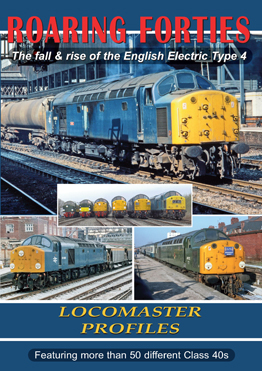Roaring Forties
 The
Class 40s were one of the most successful diesel locomotive classes of
British Railways’ 1955 modernisation plan. 200 of these 2,000 horsepower
machines entered traffic between 1958 and 1962 and spent the next twenty
years reliably employed on a wide variety of passenger and freight work.
British Rail began phasing out the Forties in the late 1970s until the
last survivors were withdrawn during January 1985. Pioneer loco D200
continued to fly the Class 40 flag for a further three years, while the
surprise re-instatement of four locos for departmental use added another
twist to an already fascinating story. And then came the preservation
era. By the summer of 1988 six locos had been preserved while D200 had
been secured for the national collection. In November 2002, 40145
triumphantly returned to the main line, followed sixteen years later by
D213 Andania. This programme picks up the Class 40 story in 1979 and
covers their rundown and eventual demise with BR before charting the
rebirth of the preservation survivors.
The
Class 40s were one of the most successful diesel locomotive classes of
British Railways’ 1955 modernisation plan. 200 of these 2,000 horsepower
machines entered traffic between 1958 and 1962 and spent the next twenty
years reliably employed on a wide variety of passenger and freight work.
British Rail began phasing out the Forties in the late 1970s until the
last survivors were withdrawn during January 1985. Pioneer loco D200
continued to fly the Class 40 flag for a further three years, while the
surprise re-instatement of four locos for departmental use added another
twist to an already fascinating story. And then came the preservation
era. By the summer of 1988 six locos had been preserved while D200 had
been secured for the national collection. In November 2002, 40145
triumphantly returned to the main line, followed sixteen years later by
D213 Andania. This programme picks up the Class 40 story in 1979 and
covers their rundown and eventual demise with BR before charting the
rebirth of the preservation survivors.
THE BRITISH RAIL ERA (75 minutes of the programme) - FREIGHT turns
include 40 035 shunting at Warrington, 40 152 on Peak Forest banking
duties, 40 015 hauling UKF vans, 40 044 shunting on Wigan Springs
Branch, 40 150 working the Amlwch tanks, 40009 on ballast, 40033 with a
Speedlink service at Hereford, 40 060 on the Manchester ‘Binliner’, and
40012 at Stanlow refinery. PASSENGER workings include 40012 and 40150 on
the Manchester-Skegness, 40056 and 40079 on West Coast drags and 40106
on a Heckmondwike to Morecambe excursion. RAILTOURS include the ‘Border
City’, ‘Broadsman’, ‘Devon Quarryman’, and ‘Don & Fiddler’ charters.
Also featured are the last operational 40s working during their last
weeks of service in the bitterly cold January of 1985 including 40044’s
penultimate working. THE RETURN OF D200 on S&C passenger work, the
Warcop MoD trip, newspapers, a rare freightliner working and a selection
of railtours, including the grey primer ‘Pennine Forty Farewell’ and the
final run from Liverpool Street to York. There is also an interview with
British Railway’s Board’s former Freight Engineer David Russell who
explains how the D200 restoration project came about. DEPARTMENTAL 97s
at Crewe station during the remodelling project and on other engineers
trains...plus 97405 hauling a failed DMU to Chester. WITHDRAWN CLASS 40s
at Crewe Works awaiting breaking, while 40013 and 40135 are used as LMR
exhibition locos. Includes the 1987 visit of 40135 to the Didcot GWR
centre where it hauled passenger trains.
THE PRESERVATION ERA (25 minutes of the programme) includes 40106 on
the Great Central and Nene Valley, 40135 and 40145 on the East Lancs and
Severn Valley, the return of 40012 Aureol including its re-naming at
Longsight, its spectacular first time fire-up in preservation and its
1995 visit to the Mid Hants Railway, D200 visiting the North York Moors
and East Lancs, and D213 Andania hauling its first train in 32 years at
Swanage. Also featured are 40145 and D213 back on the main line at
locations such as Holyhead, Kyle, London Euston, Ribblehead, Iver and
Hadley Wood. The programme concludes with the hugely successful ‘40s at
60’ gala at the East Lancs Railway which featured six of the seven
surviving locos.
Some of the footage in this programme appeared in ‘The Class 40
Story’ which was released on VHS in 1993. The picture quality on this
DVD has been vastly improved thanks to digital technology.